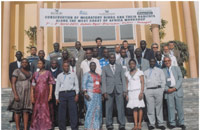BirdLife/MAVA project to boost waterbird conservation along the coast of West Africa launched
 Bonn, April 2011 - The project on “strengthening networks for the conservation of migratory birds and their habitats along the coast of West Africa” was initiated by BirdLife International in 2009 and aimed at guiding their international conservation measures for migratory waterbird conservation, research and monitoring along the coast of West Africa.
Bonn, April 2011 - The project on “strengthening networks for the conservation of migratory birds and their habitats along the coast of West Africa” was initiated by BirdLife International in 2009 and aimed at guiding their international conservation measures for migratory waterbird conservation, research and monitoring along the coast of West Africa.The project follows the typical birdlife approach by working with selected national NGOs in the seven countries involved (Mauritania, Senegal, Gambia, Guinea, Guinea-Bissau, Sierra Leone and Cape Verde). It also builds on a strong coalition of international stakeholders and partners involved in the conservation of migratory birds in the project area. The MAVA Foundation is the main donor for this project, while co-funding is provided by BirdLife International and other project partners like Wetlands International, Vogelbescherming (Dutch BirdLife Partner), the African-Eurasian Migratory Waterbird Agreement (AEWA), the Ramsar Convention on wetlands and others.
 This four year project officially started in October 2010, following the establishment of the project contract between BirdLife International and the MAVA Foundation. The project inception workshop took place in Dakar, Senegal, 7 - 8 April 2011, and brought together some 28 participants representing the national and international project partners. The workshop aimed at reviewing the project activities, in order to harmonize them with relevant on-going activities in the project area. It also aimed to concretise the sources of co-funding from the project partners, and devise a co-funding strategy.
This four year project officially started in October 2010, following the establishment of the project contract between BirdLife International and the MAVA Foundation. The project inception workshop took place in Dakar, Senegal, 7 - 8 April 2011, and brought together some 28 participants representing the national and international project partners. The workshop aimed at reviewing the project activities, in order to harmonize them with relevant on-going activities in the project area. It also aimed to concretise the sources of co-funding from the project partners, and devise a co-funding strategy.
Overall, the project is expected to significantly:
- Improve knowledge on migratory bird conservation in the project area;
- Build NGO capacity for migratory bird research, conservation and management;
- Promote participatory conservation of key sites and species, while ensuring improved livelihood;
- Promote development of sustainable monitoring systems for migratory birds and their habitats;
- Support regional policy and advocacy to ensure lasting collaboration between NGOs, governments and Multilateral Environmental Agreements.
 The Coordinator for the African Initiative of AEWA, Ms Evelyn Moloko attended the project inception workshop on behalf of the CMS and AEWA Secretariats. The project is expected to significantly contribute to the implementation of the Convention on Migratory Species (CMS), particularly AEWA and the Memoranda of Understanding on Raptors and the Aquatic Warbler.
The Coordinator for the African Initiative of AEWA, Ms Evelyn Moloko attended the project inception workshop on behalf of the CMS and AEWA Secretariats. The project is expected to significantly contribute to the implementation of the Convention on Migratory Species (CMS), particularly AEWA and the Memoranda of Understanding on Raptors and the Aquatic Warbler.
It was recommended that all project partners would be involved in seeking additional funding for the project. Meanwhile, the Wings Over Wetlands project partnership was suggested as a good framework for international fund-raising for the project. This partnership between the Ramsar Convention, AEWA, Wetlands International and BirdLife International aims to draw on the excellent collaboration developed during the WOW project and build on the outcomes of the project, thus ensuring its continuity. The BirdLife/MAVA project thereby provides a good opportunity to make use of the WOW project partnership.
Last updated on 10 April 2019


